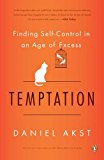Temptation: Finding Self-Control in an Age of Excess
A witty and wide-ranging investigation of the central problem of our time: how to save ourselves from what we want. Freedom is dangerous. Half of all deaths in America come from overeating, smoking, drinking too much, failing to exercise and other deadly behaviors that we indulge against our own better judgment. Why are we on a campaign of slow- motion suicide? The simple answer is that self-control is tough-especially now, when more calories, sex and intoxicants are more readily and privately available than at any time in memory. Gambling, once against the law almost everywhere, is now legal and ubiquitous. Trying to work? If so, chances are you're also struggling to resist the siren call of the Internet-to say nothing of the snack machine. But while temptations have multiplied like fast-food outlets in suburbia, crucial social constraints have eroded. Tradition, family, church and ideology have lost much of their capacity to circumscribe behavior, while financial limits, once a ready substitute for thrift, were swept away by surging affluence and the remarkable open-handedness of lenders (a confluence that recently ended in tears). The result is a world that puts more pressure than ever on the "self" in self-control, sorely testing the limits of human willpower. How can we cope with our appetites in a landscape of such boundless temptation? We Have Met the Enemy is a brilliant and irreverent search for answers that delves into overeating, overspending, procrastination, anger, addiction, wayward sexual attraction and most of the other homely transgressions that bedevil us daily in a world of freedom, prosperity and technological empowerment. Akst ransacks history, literature, psychology, philosophy and economics to alarm, teach, empower and, at the very least, entertain. Using self-control as a lens rather than a cudgel, We Have Met the Enemy draws a vivid picture of the many-sided problem of desire-and delivers a blueprint for how we can steer shrewdly toward the wants we most want for ourselves. At stake is not just our health but our humanity, for what could make us more fully human than the ability to set aside impulse when we choose to do so? We Have Met the Enemy explains not just why you can't, but how you can.

